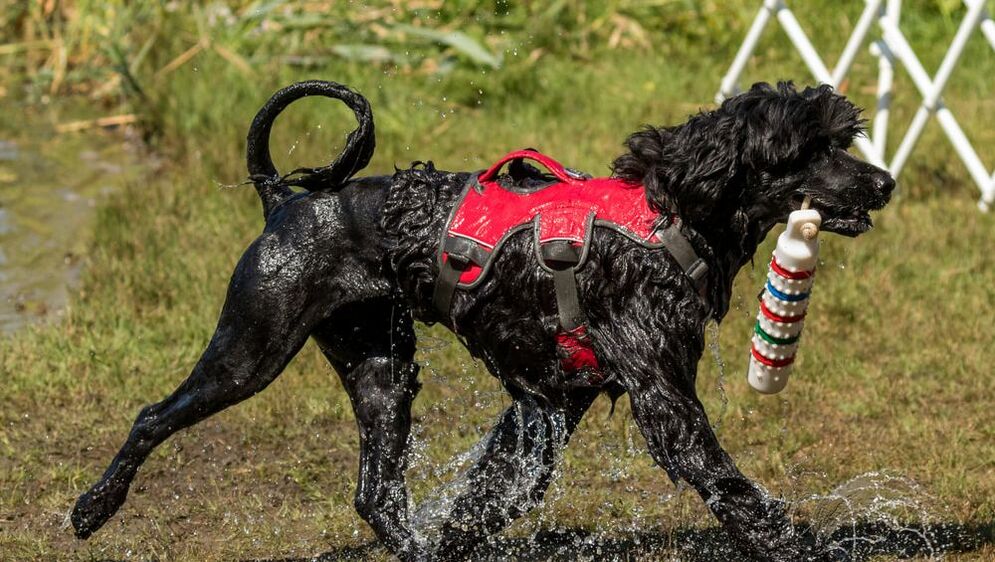PWDs - Do they make good service dogs?
According to the Americans with Disabilities Act (ADA), a service dog is “a dog that is individually trained to do work or perform tasks for a person with a disability”, where "disability" is defined as a physical or mental impairment that substantially limits one or more major life activities, including people with history of such an impairment, and people perceived by others as having such an impairment.
There are different kinds of service dogs:
The ADA considers service dogs to be primarily working animals that are not considered pets.
Emotional support animals are not considered "service dogs" under the ADA as they are not trained to provide a specific task for a disabled person. Likewise, therapy dogs are not considered "service dogs" but they do provide comfort to hospital patients, assisted living center residents, stressed travelers in airports, college students during exams, and victims of traumatic events or disasters. True therapy dogs undergo specific training programs to be able to enter hospitals and other public places and they must graduate from these programs and have regular visitations that are logged. For a listing of certification organizations for therapy dogs, please click HERE. NOTE: Therapy dogs do not have the same access privileges that service dogs do and cannot be considered a therapy dog simply because you say it is one.
Some breeds are more suited than others to become service dogs and, even within those breeds, many individuals do not have the correct personality to become a good service dog. Service dogs must be well-mannered at all times, stay focused on their task under all sorts of distractions, and must be "bomb-proof" in the face of large crowds, moving vehicles or walkways/elevators, and loud noises.
The following are general characteristics that a service dog must exhibit:
Generally speaking, the exuberant and nosey personality of a PWD does not make it an ideal service dog, although some may have been trained as hearing dogs for the deaf or as allergen detectors.
Some PWDs have been successfully trained as therapy dogs and serve as visitors to those in hospitals and nursing homes, or help settle children, or participate in reading programs for children. Understand that these dogs have personalities that are well-suited to this kind of work and that most PWDs lack that ideal temperament. These dogs have also undergone training and are simply not just labeled as a "therapy" dog without such training. Some of these dogs do great as therapy dogs for a few years, but then actually "burn out" and are stressed continuing in that role. It takes a particular personality to be a good therapy dog and not all dogs are temperamentally suited to the task.
If you are seeking a service dog, we recommend that you contact Canine Companions for Independence, Inc. (CCI) or NEADS World Class Service Dogs, both of which have extensive experience in training dogs and understanding different breed qualities. This is NOT an area in which we have expertise and we would feel extremely uncomfortable in placing one of our puppies in a home that intended to train the dog as a service dog. NOTE: service dog training takes around 2 years and starts when the dog is a young pup; these pups are exposed to all sorts of environments and noises as part of their training and are intensely trained each and every day.
Therapy dogs should undergo training and pass the requisite tests by the certifying agency. Therapy Dogs International is one such organization and many training facilities provide combined CGC and TDI tests. Alliance of Therapy Dogs is another organization that provides training and testing for certification of therapy dogs. If you simply register your dog as a therapy dog or an emotional support dog, this is not the same as actually training it to be one and that certification does not come with the training necessary to create a public-aware and impulse-controlled dog. Many businesses are now pushing back against the certified but untrained so-called therapy or emotional support dog because of lack of training.
We cannot guarantee that any of our puppies will have the necessary temperament to become your service, therapy, or emotional support dog and so will not provide you with a puppy for this expressed purpose. We also do not believe that this breed makes the best service, therapy, or emotional support dogs and would urge you to investigate breeds that are far better suited for these purposes.
There are different kinds of service dogs:
- Guide dogs help the blind or visually impaired navigate their environments safely.
- Mobility dogs assist individuals in wheelchairs or those who use walking devices, or those who have balance issues.
- Hearing dogs assist deaf individuals to recognize the phone or door bell ringing, or someone trying to get the person's attention, or someone at the door.
- Medical alert dogs signal the onset of a medical issue like seizures or low blood sugar.
- Peanut or other allergen detection dogs sweep an area to make sure it is clear of the allergen before the sensitive person enters it.
- Psychiatric service dogs assist individuals with PTSD, obsessive-compulsive disorder, schizophrenia, etc.
The ADA considers service dogs to be primarily working animals that are not considered pets.
Emotional support animals are not considered "service dogs" under the ADA as they are not trained to provide a specific task for a disabled person. Likewise, therapy dogs are not considered "service dogs" but they do provide comfort to hospital patients, assisted living center residents, stressed travelers in airports, college students during exams, and victims of traumatic events or disasters. True therapy dogs undergo specific training programs to be able to enter hospitals and other public places and they must graduate from these programs and have regular visitations that are logged. For a listing of certification organizations for therapy dogs, please click HERE. NOTE: Therapy dogs do not have the same access privileges that service dogs do and cannot be considered a therapy dog simply because you say it is one.
Some breeds are more suited than others to become service dogs and, even within those breeds, many individuals do not have the correct personality to become a good service dog. Service dogs must be well-mannered at all times, stay focused on their task under all sorts of distractions, and must be "bomb-proof" in the face of large crowds, moving vehicles or walkways/elevators, and loud noises.
The following are general characteristics that a service dog must exhibit:
- No aggressive behavior towards people and other animals.
- No sniffing behaviors unless released to do so.
- No solicitations for food or affection while on duty.
- No over-excitement and hyperactivity in public.
- Ability to tolerate novel sights and sounds in various public settings.
- No unruly behavior or excessive barking.
- No relieving themselves in public without being given a specific command.
Generally speaking, the exuberant and nosey personality of a PWD does not make it an ideal service dog, although some may have been trained as hearing dogs for the deaf or as allergen detectors.
Some PWDs have been successfully trained as therapy dogs and serve as visitors to those in hospitals and nursing homes, or help settle children, or participate in reading programs for children. Understand that these dogs have personalities that are well-suited to this kind of work and that most PWDs lack that ideal temperament. These dogs have also undergone training and are simply not just labeled as a "therapy" dog without such training. Some of these dogs do great as therapy dogs for a few years, but then actually "burn out" and are stressed continuing in that role. It takes a particular personality to be a good therapy dog and not all dogs are temperamentally suited to the task.
If you are seeking a service dog, we recommend that you contact Canine Companions for Independence, Inc. (CCI) or NEADS World Class Service Dogs, both of which have extensive experience in training dogs and understanding different breed qualities. This is NOT an area in which we have expertise and we would feel extremely uncomfortable in placing one of our puppies in a home that intended to train the dog as a service dog. NOTE: service dog training takes around 2 years and starts when the dog is a young pup; these pups are exposed to all sorts of environments and noises as part of their training and are intensely trained each and every day.
Therapy dogs should undergo training and pass the requisite tests by the certifying agency. Therapy Dogs International is one such organization and many training facilities provide combined CGC and TDI tests. Alliance of Therapy Dogs is another organization that provides training and testing for certification of therapy dogs. If you simply register your dog as a therapy dog or an emotional support dog, this is not the same as actually training it to be one and that certification does not come with the training necessary to create a public-aware and impulse-controlled dog. Many businesses are now pushing back against the certified but untrained so-called therapy or emotional support dog because of lack of training.
We cannot guarantee that any of our puppies will have the necessary temperament to become your service, therapy, or emotional support dog and so will not provide you with a puppy for this expressed purpose. We also do not believe that this breed makes the best service, therapy, or emotional support dogs and would urge you to investigate breeds that are far better suited for these purposes.



